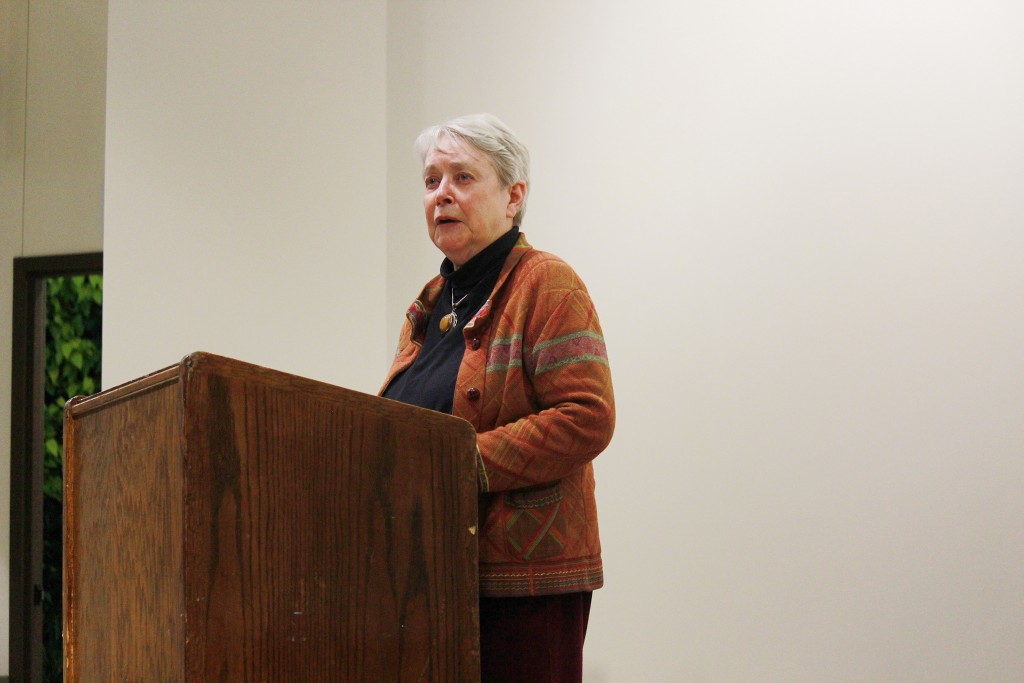
In honor of the 50th anniversary of the Binghamton University Center for Medieval and Renaissance Studies (CEMERS) and the 25th anniversary of the Aldo S. Bernardo Lecture Series, professors chose to bring a prevalent medieval scholar to campus.
This year’s speaker was Mary Carruthers, the Erich Maria Remarque professor of literature at New York University and the former president of the New Chaucer Society and the Medieval Academy of America.
Carruthers’ speech, which was titled “Terror, Horror, and the Fear of God: Why There is No Sublime,” was given in the Admissions Center to an audience of BU faculty and students, as well as visiting students from medieval departments at nearby schools like Cornell University. Carruthers took a linguistic approach to the interdisciplinary field, discussing the differences between the words “terror” and “horror” through the lens of languages, biblical translations and historic texts.
Her discussion examined the Latin roots of words “terror” and “horror,” and compared them to uses in biblical stories and 12th-century texts. She discovered that authors used “horror” to refer to something foreseeable and familiar, such as an unpleasant taste, but used “terror” when speaking of something unknown or unpredictable, such as pain or God. Since both words are intertwined in the Bible, Carruthers examined the linguistic differences she said made a difference in the story meanings.
“I hope [the audience was] very puzzled and I hope they think about these things a great deal more,” Carruthers said. “And [they should] understand that language and specific concepts develop over time and we need to pay close attention to that — we cannot simply assume that these words mean the same things.”
CEMERS director Marilynn Desmond introduced Carruthers, and said she has been influential in the field for years. She explained that Carruthers published books pertaining to intellectual history and memory well before anyone in the CEMERS area was beginning to discuss the topics.
“Professor Carruthers is one of the most prominent medievalists in the world working on topics related to intellectual history,” Desmond said. “Her work really shows that you can go between these different disciplines and bring out this kind of rich access — gain rich access to medieval culture. She is one of the foremost thinkers in this line, and so she was an obvious person to invite.”
CEMERS holds national recognition and was one of the first medieval studies centers in the United States at the time of its establishment in 1966. Since then, the Bernardo fund — started by Bernardo’s wife to further medieval studies at BU — has enabled the department to bring nationally renowned speakers to campus.
“This is always a highlight of the year for medievalists and medieval studies,” said Dana Stewart, the head of the romance languages and literature department. “It’s so exciting to get to hear really prominent people from across the country who come here to talk every year at this particular event.”
The event was open to all University students, and many students who are taking classes within the CEMERS department were encouraged by their professors to attend. Bridget Whearty, an English and medieval studies professor, said that driving students to events like these was vital.
“Half of our job as professors is being teachers, and half of our job is [encouraging students to come to these events],” Whearty said. “I feel like there’s this whole secret university that students don’t know about, and so even if coming to a talk like this is hard and scary and weird, you’re eavesdropping on the hidden life of the University. And I think that’s really important, because that’s part of what you’re funding — you make this possible, and you’re why we care.”


